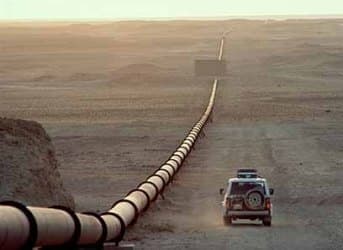Iraq and Jordan have inked an agreement to build a pipeline across Jordan to the Red Sea city of Aqaba to deliver more Iraqi crude to Jordan, which is reeling under the pressure of shortages and higher prices.
The new one-billion-barrel/day-capacity pipeline will run across Jordan to Aqaba and supply Jordan with Iraqi crude more easily, replacing the use of oil tankers.
Iraqi Prime Minister Nouri al-Maliki also promised to make good on an earlier 2009 pledge to create a free trade zone with Jordan.
In November, Jordan imported some 300,000 barrels of oil from Iraq via tanker trucks, at an $18/barrel discount. After transportation costs are figured in, the discount is about $5/barrel. On average, Jordan imports about 10,000 bpd from Iraq. Iraq has promised to increase that average to 15,000 bpd (about 15% of Jordan’s needs).
Logistics have been challenging, and the high cost of tanker truck transportation—especially when Iraq is selling Jordan oil at a heavily discounted price--cannot be sustained. Hence the pipeline plans.
For Jordan, which has to import almost all of its energy needs--and where rising fuel prices are threatening the country’s stability through violent protests—the deal with Iraq is urgent.
Jordan is desperate, and unrest has swelled since the government cut public energy subsidies leading to a 50% hike in the price of gas cylinders and price increases for electricity and petrol as well.
In November, three people were killed and at least 70 people were wounded in violent protests which broke over a major rise in fuel prices. December has been a touch-and-go month, and another outbreak of violence is a looming threat that could escalate out of control into a complete breakdown of political stability. Protests are about fuel prices on the surface, but deeper down they are against the Jordanian king.
Related Article: Iran-Pakistan: Western Pipeline Nightmare
Jordan’s Gulf Cooperation Council (GCC) cohorts are definitely concerned—but not as concerned as they should be.
Outside of the GCC, only Iraq and Iran could help Jordan.
For Iraq, supplying Jordan with fuel and building a new pipeline involves an interest bit of geopolitics and no shortage of local domestic political wrangling.
Iraq is battling two fronts—sectarian violence that it ready to move to the next level, and an oil and gas war with the Iraqi Kurds.
Iraqi Sunnis are up in arms over the “kidnapping”, which later turned out to be the arrest of 10 personnel working for Iraqi Finance Minister Rafia al-Issawi. The 10 were arrested on terrorism-related charges. This incident prompted tens of thousands of Sunnis to take to the streets in the Sunni heartland in Anbar province—particularly in Issawi’s hometown of Fallujah--blocking the main highway linking Baghdad with Jordan (and Syria).
It’s not the first time Iraqi Shi’ite Prime Minister Nouri al-Maliki has targeted Sunni officials in the government, and it is a recipe for increased sectarian violence. A year ago, Maliki had 70 bodyguards of Sunni Vice President Tariq al-Hashemi arrested on terrorism-related charges. Hashemi himself was convicted of orchestrating death squads and sentenced to death. He remains in exile in Turkey.
The Kurds in Northern Iraq have again halted exports over Baghdad’s non-payment of revenues. In September, Baghdad paid $848 million of the $1.5 billion it owns Iraqi Kurdistan, but the rest is outstanding. Before exports were halted again in December, Kurdistan was exporting around 180,000 barrels per day through pipelines controlled by the central Iraqi government.
Related Article: Iranian Gas and the Nabucco Pipeline Realities
Iraq was hoping to pump a total of 3.7 million bpd and export 2.9 million bpd in 2013, and it needs the Kurdish contribution to meet these numbers. (Iraq has the world’s fourth largest proven reserves of conventional crude—over 143 billion barrels.)
Iran has offered to help Jordan, too. The offer: free oil for three decades—a significant offering for a country that has an annual oil bill of about $2.5 billion and represents a major burden on the government. Of course, this offer comes with a few political strings attached.
It’s a lifeline that is tempting to grab on to in the face of socio-economic unrest that could threaten the government. Iran, in return, would gain a significant foothold in the region, close to Syria and on the margins of the GCC. On paper, all Iran is asking for in return is that Jordan open its doors to “religious tourism”—Iranian pilgrims. It is a choice between instability and regime preservation.
It is also not lost on anyone how Iran has risen to this occasion, while the Gulf countries offer support only latently and piecemeal.
By. Charles Kennedy of Oilprice.com

















